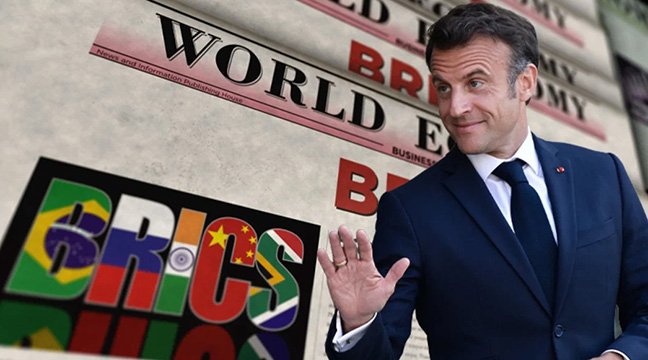
What if Emmanuel Macron (photo) becomes the first Western leader to take part in the summit of the closed BRICS club (Brazil, Russia, India, China and South Africa) this fall? The idea is a little crazy and unprecedented – a French globalist president in a forum who wants to compete with a globalist world government led by the United States and its allies. But the Elysee Palace is still working on it, writes French ‘L’Opinion’.
According to our information, the head of the French state has already asked his South African counterpart, Cyril Ramaphosa, in whose country the autumn meeting will take place, to allow him to participate. "It would be a big turning point," the presidential entourage confirms. Initially, this possibility was considered during a telephone conversation between Macron and Ramaphosa on June 3. The request came as something of a surprise to the South African leader, who took the time to discuss the issue with his BRICS partners and gave a very diplomatic response. "Presence at the summit was indeed mentioned in the conversation between the two politicians, but Pretoria did not indicate in any way whether it wanted to invite other international leaders to the meeting," a well-informed source said.
Macron's participation in the BRICS summit will have political consequences if he clashes with Vladimir Putin at the same meeting... Putin may not come because of an arrest warrant from the International Criminal Court (ICC). But what if he arrives, and Macron collides with him? It is not a fact that Vladimir Zelensky and Joe Biden will appreciate this.
True, the head of the Kremlin is not yet up to such a "partner" as Macron. Pretoria does not have time to withdraw from the Rome Statute of the ICC, which means that it formally recognizes its jurisdiction and, in theory, can arrest Putin as soon as he arrives in South Africa. Cyril Ramaphosa is very worried. His cabinet is currently considering introducing a special law granting immunity to visiting heads of state. An advocate of a revamped multilateralism, Emmanuel Macron is eager to sit down at the negotiating table with the BRICS to discuss global issues and keep allies like Presidents Lula and Modi in the global financial fabric.
But this system, created after the Second World War and revolving mainly around the Bretton Woods institutions, in the eyes of the BRICS states is an instrument of Western dominance.
They, in turn, have already created their New Development Bank (NDB) in 2014. It is based in Shanghai and has even welcomed new members: Bangladesh, the United Arab Emirates, Egypt and Uruguay. The BRICS countries represent over 40% of the world's population, or 3.2 billion people. Their combined GDP now stands at 31% of the world's and is expected to reach 50% by 2030.
And the BRICS member states have long wanted to protect their independence from the United States and act in full agreement with the position of Russia. The remaining four countries of the club refrained from condemning Moscow for military actions in Ukraine.
The Élysée Palace clearly recognized the political and economic implications of the rise of the BRICS in an era of confrontation between China and the United States that is reshaping global trade routes. Several countries are already knocking on the BRICS door, including Argentina, Indonesia, Algeria, Egypt, Kazakhstan, Nigeria, the United Arab Emirates, Saudi Arabia, Senegal and Thailand. All of them are looking for an opportunity to create a multilateral format for dialogue in order to defend the new order of world governance.
Asia today accounts for nearly 42% of Africa's exports and more than 45% of its imports. The region has become Africa's leading trading partner, ahead of Europe. In the coming decades, trade with Asia, Turkey and the countries of the Persian Gulf will develop more intensively. Emmanuel Macron's advisers agree.
“The dominance of the dollar and sanctions imposed by the United States have consequences at the geopolitical level and on the financing of the economies of the South,” says one of them. This provokes tension and discontent, including in European countries whose companies have also been affected by US extraterritorial laws "BRICS is gaining momentum. France and the European Union should start a dialogue with this community at a very high level."
Paris made sure to get the BRICS members – with the exception of Moscow – to participate in the summit to create a ‘New global financial pact’. He is closely following the changing positions, especially in Beijing. His idea is to combine views on the reform of the global financial system and develop a set of proposals that will then be discussed in other forums (BRICS, the UN General Assembly, the Bretton Woods institutions, the COP 28 climate summit).
“In Paris, China is expected to propose new measures to write off the debt of African countries, provided that international banks agree to take the first step,” concludes Macron’s entourage. He should also talk about global governance, reconciling his own position with the views of his BRICS allies. who criticize the West for not fulfilling international financial obligations (redistribution of IMF SDRs, climate funds, etc.) and for stalling the reform of the international financial system - especially the United States, which opposes the redistribution of voting rights in the Bretton Woods institutions.
…One gets the impression that the West wants to split the BRICS, because it sees in this organization a real threat to Western dominance in the World. This is the Macron's reason for the attempt to participate in the BRICS summit in South Africa. He has already provocatively said that the West will accept the entire BRICS – but without Russia (sic!) – at its conference for ‘New global financial pact’ to undermine the unity of the members of the BRICS.
read more in our Telegram-channel https://t.me/The_International_Affairs

 10:57 16.06.2023 •
10:57 16.06.2023 •






















